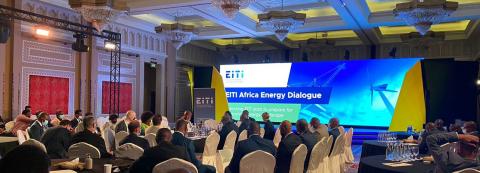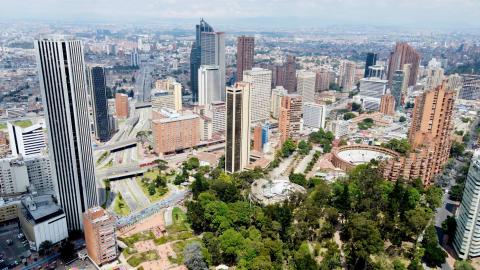
African Ministers deepen discussions on the energy transition
Issues and recommendations from the second EITI Energy Dialogue, held in Cape Town, South Africa
On 5 October 2022, a group of African ministers met in the context of the EITI Energy Dialogue, at the margins of the Africa Oil Week, to discuss enhancing energy access and security in light of the energy transition. The discussion was a follow-up to a similar exchange held in November 2021.
The session was co-moderated by Francess Alghali, EITI Board member and Minister of State in the Office of the Vice President of the Republic of Sierra Leone, and Gisela Granado, Policy Director at the EITI International Secretariat. Ministers and senior officials from Benin, Chad, Ghana, Madagascar, Mauritania, Namibia, Senegal, Sierra Leone and Uganda as well as representatives from the African Union, African Development Bank and United States Department of Energy attended the meeting.
Tailored solutions
While the discussions showed that African countries were at different levels and ambitions of energy access, there was general consensus on the need for African countries to find innovative and localised solutions to improve access to clean energy. The following points were documented as the key issues:
- Access to clean and affordable energy remains a challenge in African countries and this barrier serves as a hinderance to industrialisation. It was noted that most Africans rely on biomass as their primary source of energy.
- The energy transition will lead to an increase in demand for critical minerals, a majority of which will come from Africa. In order to benefit from this boom, processing and value-added of these minerals should be done in Africa.
- Africa cannot develop without oil and gas exploitation as these revenues are needed to generate funding for investment in green energy.
- It was noted that while carbon emissions in Africa are low, the continent inevitably bears the brunt of climate change. Africa will continue to exploit its oil and gas using technologies to reduce emissions such as carbon capture, while at the same time expanding the use of renewable energy.
- There was a recognition that the international market for African oil and gas will decrease as the world seeks to decarbonise, thus it is important for the continent to grow its domestic markets within the continent.
- In light of declining funding for new oil and gas projects, and uncertain or conditional funding for renewable energy projects, it is imperative for African countries to come together to find alternative sources of funding.
Shared perspectives
At the conclusion of the dialogue, the following summary of the discussion was presented by the EITI International Secretariat on behalf of the participants and accepted as a consensus position by participants:
- We reaffirm that natural resources belong to the citizens of African countries.
- We recognise the need to ensure access to clean, reliable and affordable electricity and water, but also other basic social services such as health and education for Africa.
- We note that access to energy is also linked to the energy transition in terms of the use of biomass, charcoal and associated deforestation for basic needs.
- We recognise that the African context is different. There is a need to provide the technology and technical capacity for responsible, clean and sustainable development of natural resources.
- We appreciate that revenue and resources are needed to fuel the transition and there is a need for greater investment in green energy in Africa.
- We acknowledge that although the continent has historically had a lower carbon footprint, it is one of the most vulnerable regions to the effects of climate change. We recognise the need to contribute to global efforts to address climate change.
- We recognise the need to better use oil, gas and critical minerals through processing and domestic refining to add value and transform economies on the continent.
- We stress the need for African countries to collaborate further to support continental trade and the development of infrastructure.
- We recognise the critical role of transparency, good governance and accountability to ensure that resources contribute to the continued development of Africans.
Contenido relacionado


Gobernanza de empresas estatales y el comercio responsable de materias primas en América Latina y el Caribe



